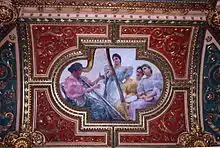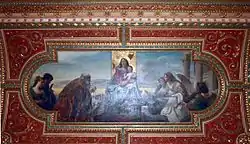Ivan Tišov
Ivan Tišov (8 February 1870 – 20 September 1928) was a Croatian painter. He studied art at the Academy of Fine Arts, Munich, bringing back ideas from the Munich Secession movement to Zagreb. He is best known for his work in public and government buildings in Zagreb, and paintings in churches in his native Slavonia in north-east Croatia.
Ivan Tišov | |
|---|---|
 "Art" (Umjetnost) by Ivan Tišov, Croatian Institute of History | |
| Born | 8 February 1870 |
| Died | 20 September 1928 (aged 58) |
| Nationality | Croatian |
| Known for | Oil painting, graphic art |
| Movement | secessionism |
Biography
Ivan Tišov was born in the village of Viškovci near Đakovo.
He attended elementary school in the village, and continued his education at the School of Crafts in Zagreb. He attended the School of Applied Arts in Vienna, and received a scholarship to the Academy of Fine Arts, Munich. From 1895, he was a vocational teacher, and professor of painting and drawing at the Academy of Fine Arts, Zagreb where he worked for the rest of his life.[1]

While he was still studying in Vienna, Tišov received a commission to paint four allegorical works on the ceiling of the Golden Hall in Zagreb, under the titles of worship, theology, art and science. With his picture of Art, also known as Music, Tišov won a bronze medal at the Millennium Exhibition in Budapest in 1896.[1]
Tišov painted many portraits, working directly with brush, without sketches and drawings achieving an amazing likeness. He painted his wife Ana Neuhäuser, Vladimir Vidrić, Grga Martić and many others.
By the end of the century, Tišov's painting showed the influence of Vlaho Bukovac. His pictures became darker with contrasting yellow, blue and green. Themes were taken from his native Slavonia, such as the painting "Under the Maple" (Pod javorom) which is one of his most beautiful works. In later years, folklore would replace mythology. In addition, Tišov worked on wall paintings in Križevci and Bjelovar, in St. Catherine and other churches.[2]
He spent a year (1913–1914), training in Paris at the Académie Julian, to prepare for making decorations in the University Library in Zagreb.
He died in Zagreb on 20 September 1928.
Legacy
Ivan Tišov's paintings of worship, theology, art and science decorate the ceilings in the Croatian Institute of History in Zagreb.
Although largely in the shadow of the other greats of Croatian art at the time (primarily Vlaho Bukovac, his work has an essentially timeless quality. He was a skilled colourist, and his work contains originality of composition, yet lacks the freedom of expression that marks other contemporary painters. However, as much of his painting was large government orders, and for the church - altar paintings in the Roman Catholic Church, the Orthodox Iconostasis of the Church of Saint Nicholas in Pačetin,[3] the foyer ceiling of the Croatian National Theatre, and the "Golden Hall" building of the Department of Religion and Education of the Government of Zagreb - that should not be too surprising. His paintings mark the late classical period and its transition towards secession style in painting.[1]
Works
Tišov's works include:[1]
- Worship (Bogoštovlje)
- Theology (Nastava)
- Art (Umjetnost), also sometimes known as Music
- Science (Znanost)
- Kiss (Poljubac), 1902
- Paris Court (Parisov sud), 1902
- Salome Dances (Ples Salome), 1902
- Piper from Posavina (Gajdaša iz Posavine), 1902
- Under the Maple (Pod javorom), 1906
- Portrait of Ana Neuhäuser
- Portrait of Vladimir Vidrić
- Portrait of Grga Martić
- Foyer ceiling of the National Theatre in Zagreb, 1905
- Kraljevac Stream (Potok Kraljevac), 1912
- Self-portrait (Autoportret), 1914
- Decorations for the University Library (now National Archives) in Zagreb, 1914
- Wealth of the World (Bogatstvo svijeta), 1916
- Stream in Winter (Potok zimi), 1922
- Creation, Last Judgement in the Greek Catholic Cathedral in Križevci
- Oil paintings and frescoes in a number of churches in Zagreb, Križevci Korenica, Bjelovar, Plaško, Stražeman
Public institutions
Tišov's work can be found in the following public buildings[1][2]
- Croatian Institute of History, Zagreb
- Croatian National Theatre, Zagreb
- Croatian National Archives, Zagreb
References
- Ivana Rončević. "POSTOJANI KLASIČAR Retrospektivna izložba Ivana Tišova u Galeriji likovnih umjetnosti u Osijeku (srpanj – rujan 2005.)" (in Croatian). matica hrvatska. Retrieved 26 March 2011.
- "Ivan Tisov". HRT News Archive (in Croatian). Hrvatska radiotelevizija. Archived from the original on 17 December 2007. Retrieved 26 March 2011.
- Damjanović, Dragan. "Ivan Tišov, Vinko Rauscher i ikonostas crkve svetog Nikole u Pačetinu u Slavoniji (Ivan Tišov, Vinko Rauscher and the Iconostasis of the Church of Saint Nicholas in Pačetin in Slavonia)". Croatian Scientific Bibliography. Retrieved 26 March 2011.